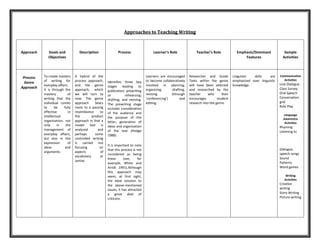
Approaches to teaching writing
- 1. Approaches to Teaching Writing<br />ApproachGoals and ObjectivesDescriptionProcessLearner’s RoleTeacher’s RoleEmphasis/Dominant FeaturesSample ActivitiesProcess Genre ApproachProcess ApproachTo create masters of writing for everyday affairs.It is through the mastery of writing that the individual comes to be fully effective in intellectual organization, not only in the management of everyday affairs, but also in the expression of ideas and arguments.“In this approach current emphasis focuses on the process of creating writing rather than the end of the product” (Tompkins, 1990)Students are trained to generate ideas for writing, think of the purpose and audience, and write multiple drafts in order to present written products that communicate their own ideas. Furthermore, learning to write is seen as a developmental process that helps students to write as professional authors do, choosing their own topics and genres, and writing from their own experiences or observations. A writing process approach requires that teachers give students greater responsibility for, and ownership of, their own learning. Students make decisions about genre and choice of topics, and collaborate as they write.A hybrid of the process approach, and the genre approach, which we will turn to now. The genre approach bears more to a passing resemblance to the product approach in that a model text is analyzed and perhaps some controlled writing is carried out focusing on aspects of vocabulary or syntax.“Process writing is learning how to write by writing” (Stone, 1995) This kind of approach leads the students into a more, comprehensive writing experience in which they are now given the chance in writing their own genre and topic, and this time, they are expected still to communicate and answer critical questions regarding their target audience and of course the idea of using the grammar features in a good manner. Identifies three key stages leading to publication: prewriting or rehearsing; drafting; and revising. The prewriting stage includes consideration of the audience and the purpose of the letter, generation of ideas and organization of the text (Hedge 1988). It is important to note that this process is not considered as being linear (see, for example, White and Arndt 1991).Although this approach may seem, at first sight, the ideal solution to the above-mentioned issues, it has attracted a great deal of criticism. The teachers let the students pick and produce their own ideas of what and how they are going to write their compositions, they are allowed to have drafts and edit them after checking so that in the end, a splendid writing composition will be made by the students. This particular approach considers the students as professional writers because they set their minds with a particular type of audience that will inevitable help them in constructing their ideas in writing. In this way, they practice and exhaust all the ideas to be able to produce a very impressive work in the end. During the writing process, students engage in pre-writing, planning, drafting, and post-writing activities. However, as the writing process is recursive in nature, they do not necessarily engage in these activities in that order.Learners are encouraged to become collaboratively involved in planning, organizing, drafting, revising (through ‘conferencing’) and editing.To impress and communicate at their readers in way that they will be able to apply every language/grammar feature they have learned. Students make decisions about genre and choice of topics, and collaborate as they write.Researcher and Guide Texts within the genre will have been selected and researched by the teacher who then encourages student research into the genre. Hillocks (1984)The teacher’s role in the process model is to facilitate the writing process rather than to provide direct instruction (Teacher as the facilitator)Students are given considerable freedom within the task.Teachers who use this approach give students time to tray ideas and feedback on the content of what they write in their drafts. As such, writing becomes a process of discovery for the students as they discover new ideas and new language forms to express them. Teachers are considered facilitative in a way that they will aid their students in making their written discourse lovely and effective regarding the questions raised for their audience. Linguistic skills are emphasized over linguistic knowledge.Encourages students to communicate their own written messages Communication of the message is paramount and therefore the developing, but inaccurate attempts at handwriting, spelling, and grammarCommunicative ActivitiesLine DialogueClass SurveyOral SpeechConversation gridRole PlayLanguage Awareness ActivitiesRhymingListening to Dialogue, speech songsSound PatternsWord gamesWriting ActivitiesCreative writingStory WritingPicture writingPrewritingGroup brainstorming on a given topic (students work cooperatively and write down all the ideas that come to mind in connection with a topic)WritingCollaborative writing (students work together to write a previously agreed text)<br />
